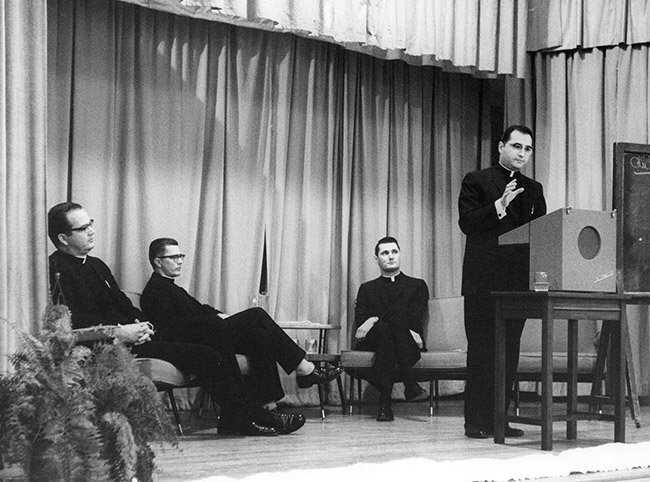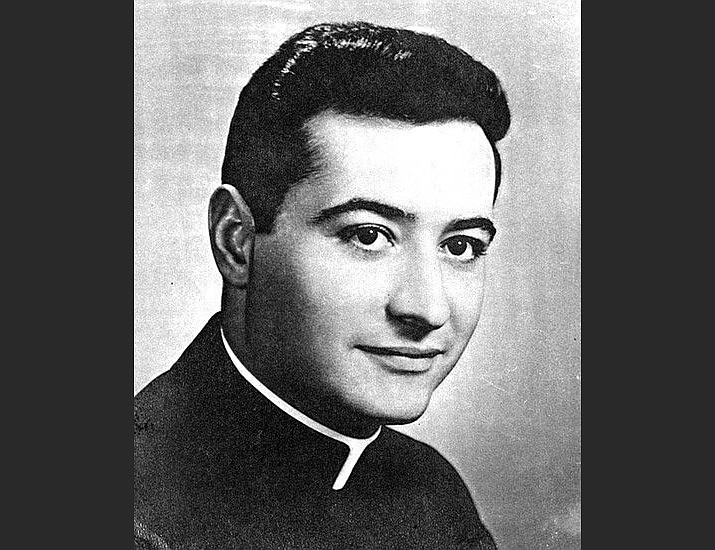He worked with the United Farm Workers in Oregon, counseled draft-age men on how to register as conscientious objectors during the Vietnam War, protested America's nuclear weapons program, and was arrested in 1985 in front of the South African Embassy in Washington as part of the worldwide movement against the apartheid regime. But this radical grew from some of the most conservative ground possible, starting out as a Catholic priest in Little Rock.
Joseph Henri Biltz was born on May 29, 1930, in Little Rock and studied philosophy at St. John's Seminary — now the St. John's Center in Pulaski Heights, the headquarters of the Catholic diocese. There, he received his bachelor's degree in 1951. He then completed four years of additional study in theology and was ordained by the Catholic Church in 1955 at the Cathedral of St. Andrew.
Biltz went on to earn a master's degree in theology (1957) and a doctorate in moral theology (1962) from the Catholic University of America in Washington before completing two years of postdoctoral study in theology (1963–1964) at the Academia Alfonsiana in Rome. He was an assistant professor of theology at St. John's Seminary in Little Rock from 1959 to 1966 and served as dean of students of the College and Theology departments from 1961 to 1966 (excluding the years of his postdoctoral studies). Throughout his early career, Biltz's interest in human rights and community activism was apparent; he served as a member of the steering committees of the Little Rock Conference on Religion and Race (1964–1967), the Little Rock Catholic Inter-racial Council (1963–1967), the Little Rock Diocesan Ecumenical Commission (1966–1967) and the Arkansas Council on Human Relations (1963–1967).
In 1967, he left St. John's Seminary and served as pastor of St. Francis of Assisi Church in Forrest City for a short time. There, he initiated a Headstart program and organized the Bi-racial Forrest City Council on Human Relations, serving as co-chair. From 1967 to 1971, Biltz was an associate professor of theology at Mount Angel College in Oregon, where he continued his commitment to service on the President's Student-Faculty Advisory Board (1968–1971) and as faculty adviser to the Black Student Union (1969–1971).
Biltz helped the United Farm Workers in Oregon organize during grape and lettuce boycotts; proposed and later supervised using the college dormitories as housing for migrant workers; and volunteered with the Valley Migrant League to help families receive services. He also counseled campus conscientious objectors to the Vietnam War.
 Joseph Biltz (right) with David Boileau, James Drane and Bruce Street at a seminar on racism at the Our Lady of the Holy Souls Church auditorium in Little Rock in February 1963. (Courtesy of the Butler Center for Arkansas Studies, Central Arkansas Library System)
Joseph Biltz (right) with David Boileau, James Drane and Bruce Street at a seminar on racism at the Our Lady of the Holy Souls Church auditorium in Little Rock in February 1963. (Courtesy of the Butler Center for Arkansas Studies, Central Arkansas Library System)
Reacting to his involvement with migrant workers, the Church transferred Biltz back to Arkansas, where he worked for a year on the staff of the Catholic Student Center at the University of Arkansas, Fayetteville and as associate pastor of the University Parish. In Fayetteville, he continued his work with the United Farm Workers, organizing and chairing the Lettuce Boycott Committee, and served on the Diocesan Commission for Hospital Ethics before leaving to complete the coursework for his second master's degree — this one in studies in aging from North Texas State University in Denton, Texas, followed by a residency at the Isabelle Geriatric Center in New York.
From 1975 to 1978, Biltz served in Arkansas as resettlement director of the Diocese of Little Rock's Indochinese Refugee Resettlement Program; diocesan coordinator of "Liberty and Justice for All — Call to Action"; and associate director of Catholic Charities and Social Services. Biltz was a co-founder of the Arkansas Coalition to Abolish the Death Penalty (1977); served on the planning and program committee of the Arkansas Chapter of the National Conference of Christians and Jews, now known as Just Communities of Arkansas (1976–1985); and helped organize the Arkansas Interfaith Task Force for Central America (1980).
Biltz's commitment to social justice, which was unpopular with Church officials, continued in the later years of his career. In 1983, Biltz made headlines by accompanying anti-nuclear weapons protester James Sauder to a Titan II Missile silo, where Biltz prayed while Sauder spread holy water. In 1985, Biltz was among those arrested while protesting apartheid in front of the South African Embassy.
Biltz died of a heart attack on Nov. 29, 1987. Upon his death, Msgr. Royce Thomas, vicar general of the Catholic Diocese of Little Rock, was quoted in the Arkansas Democrat as saying that Biltz "was a voice for the voiceless and a champion for the underdog. He tried to help those who could not help themselves." In a retrospective published in Arkansas Catholic 30 years after his death, Msgr. John O'Donnell said of Biltz, "He went from being a little altar boy with the shiny shoes and combed hair into a revolutionary."
— Stephanie Bayless
This story is adapted by Guy Lancaster from the online Encyclopedia of Arkansas, a project of the Central Arkansas Library System. Visit the site at encyclopediaofarkansas.net
